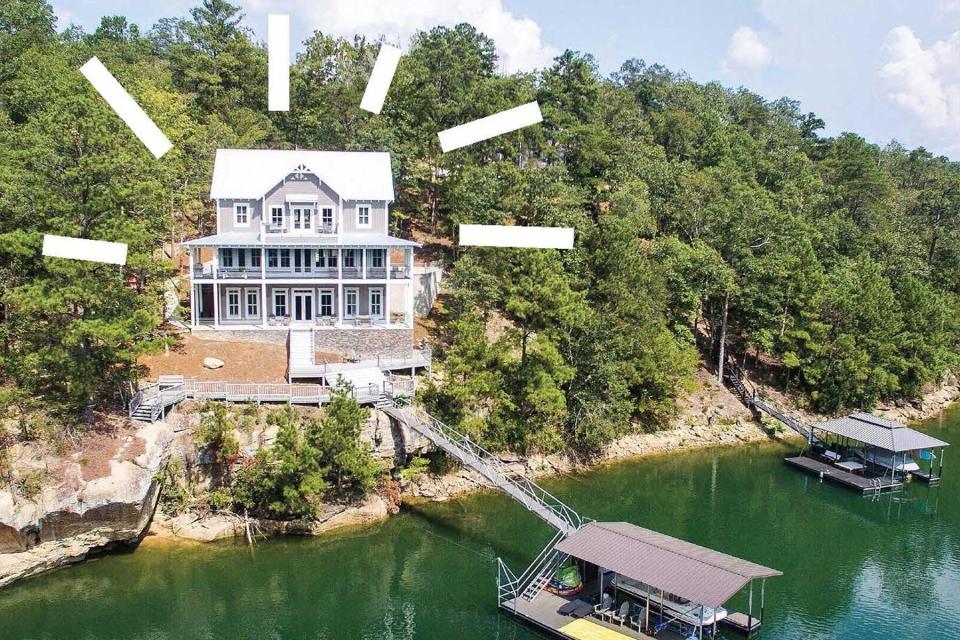A Vacation Rental Scam Cost This Traveler $20K — Here's the Red Flag She Missed

"In retrospect," says Melany Robinson, "the pricing was too good to be true." Robinson, a hospitality publicist and seasoned traveler who lives in Birmingham, Alabama, was surfing Craigslist in the summer of 2020, looking for a ski-season rental in Park City, Utah. She came across a five-bedroom, five-bath chalet with panoramic views, a wood-burning fireplace, and an outdoor deck complete with a hot tub. It looked perfect for her family and was available for her dates in February and March of this year.
Related: Ready to Plan a Family Vacation? These Are the Most Popular Family Stays on Airbnb
Robinson e-mailed the contact listed and quickly heard back from someone calling himself Thomas. Using public records, she matched that name with the property's deed holder and began discussing rental terms. Thomas promptly answered all her questions, and, in July, she wired him a first installment of $6,700. Over the next few months, as Robinson underwent treatment for cancer, Thomas frequently checked in by e-mail. In the fall, she sent the balance of $9,700 — plus a $3,600 deposit for a 2022 rental. Nothing seemed amiss.
But in January, Thomas e-mailed to say someone had died of COVID-19 in the house. He said he would need an additional $14,000 for cleaning — and asked Robinson to wire $8,000 on top of what she'd already paid. That was the moment Robinson knew she'd been scammed. She contacted law enforcement, who advised her to continue corresponding with Thomas in order to gather more evidence of criminal activity. But Thomas always found a way to hedge, and then stopped replying entirely.

Courtesy of Vrbo This legit rental, on Alabama’s Lewis Smith Lake, is listed on Vrbo.
Robinson eventually tracked down the actual owner of the home, who had no knowledge of the scam. She determined that the fraudster had created the bogus Craigslist post by copying photos and information from a property listing. But Robinson has yet to recover any of the $20,000 she lost.
"The personal violation was by far the hardest part," she says. "Even harder than the money."
Robinson's story illustrates the latest perils facing anyone shopping for a vacation rental. Fortunately, there are ways to protect yourself.
Watch for Red Flags
Renters should keep an eye out for a few key hallmarks of fraud, says Michelle Couch-Friedman, executive director of the consumer group Elliott Advocacy.
"When the host has a sense of urgency that you must decide on the property soon, and asks you to pay via wire transfer or with a cash app like Zelle," Couch-Friedman says, "that's a red flag." Other danger signs are new listings with no reviews and grainy photos that could be screenshots lifted from other sites.
Related: The Best Sites for Booking a Vacation Rental Property
Think Small
Couch-Friedman suggests going through a brick-and-mortar company. "The opportunity for vacation-rental scammers to conduct their business through a small, well-regarded agency just doesn't exist," she says.
Boutique agents often have personal relationships with property owners. Consider the example of Homebase Abroad, which specializes in luxury villa rentals in Italy. "With us, there's no one in between," cofounder Mara Solomon says. "I've seen the houses. I know the owners. I've slept in the beds. And I can share all that directly with guests."
Other agencies, such as TurnKey Vacation Rentals, also independently check out every one of their listings. "We physically verify each home and owner, and visit the home regularly to make sure it is maintained, cleaned, and guest-ready," says John Banczak, TurnKey's cofounder and CEO.
Play by the Rules
Big rental platforms including Airbnb and Vrbo have comprehensive security procedures in place. Vrbo provides payment protection against listing fraud, phishing, and significant misrepresentations, as well as round-the-clock customer service, according to spokesperson Alison Kwong. Airbnb safeguards payments and personal information — and will offer refunds or reaccommodation in the event of a problem.
"It is virtually impossible to be scammed using Vrbo or Airbnb if you follow all the rules of the sites," Couch-Friedman says.
As for Robinson, despite her experience, she says, "I will definitely rent homes again — but I'll insist on talking to the owner, touring the home, paying via credit card, and booking through a small firm so that I'm better protected."
A version of this story first appeared in the June 2020 issue of Travel + Leisure under the headline The Case of the Disappearing Vacation Rental.